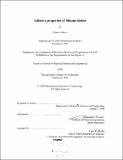Adhesive properties of silicone resins
Author(s)
Chéron, Bruno (Bruno Jean Michel), 1976-
DownloadFull printable version (4.874Mb)
Advisor
Frederick J. McGarry.
Terms of use
Metadata
Show full item recordAbstract
An experimental study on adhesive properties of Phase I rubber toughened rigid silicone resins was performed to determine the possibility of an application such as structural adhesives. Single-lap shear tests were used to study several parameters, such as the thickness of the joint, the overlap length, the behavior at high temperature and a comparison with different adhesives. Results suggest that a 10% KPE / 6% Cab-O-Sil® modified silicone resin shows optimal adhesion for sandblasted plates and a 0.1 mm thick joint, whereas such an optimum has not been observed for the untoughened resin. For small overlaps, the failure criterion is the shear strength of the resin, whereas for laps over 20 mm, it is the applied load. Toughened silicone resins behave well at high temperatures, as the strength of the joint is half as small between 150 and 250 °C as it is at room temperature. Furthermore, no degradation has been noticed for exposures up to 200°C and up to 500 hours, but the resin starts decomposing after 10 hours at 250°C. Last, comparison with other commercial glues proves that the studied toughened silicone resin provides a relatively strong bond, between the performance of epoxy glues and cyanoacrylate adhesives.
Description
Thesis (S.M.)--Massachusetts Institute of Technology, Dept. of Materials Science and Engineering, 1998. Includes bibliographical references (leaves 70-76).
Date issued
1998Department
Massachusetts Institute of Technology. Department of Materials Science and EngineeringPublisher
Massachusetts Institute of Technology
Keywords
Materials Science and Engineering